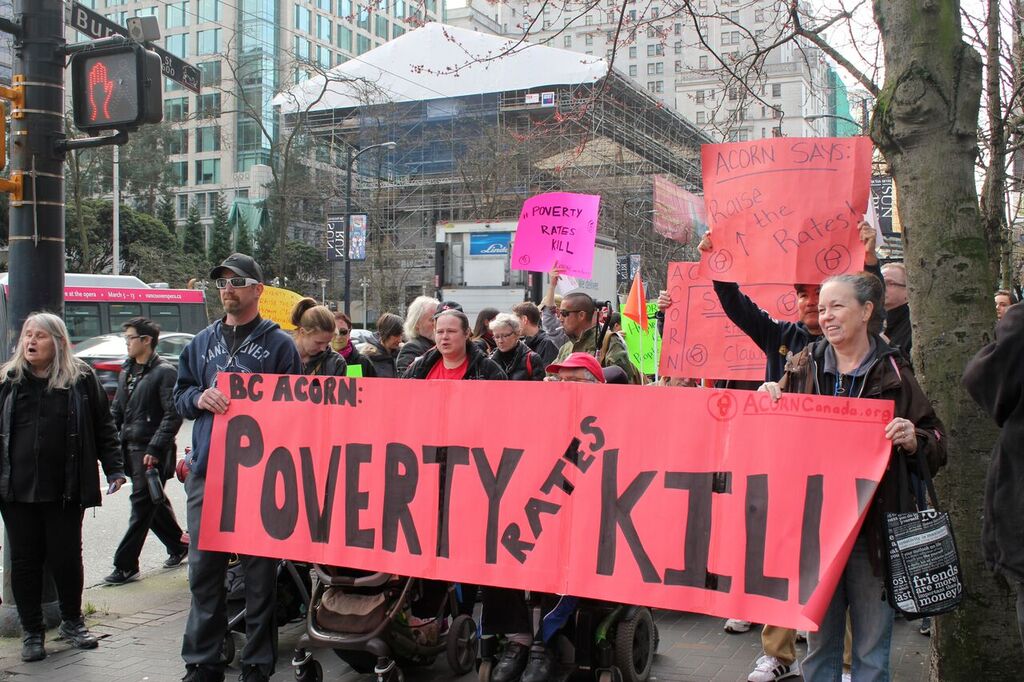Like this article? rabble is reader-supported journalism. Chip in to keep stories like these coming.
The B.C. Liberals lifted a nine-year freeze on persons with disability (PWD) rates as they released their budget for 2016 on February 16.
The previous monthly rate of $906 has been increased by $77 per month starting Sept. 1 and will affect 100,000 said British Columbia Finance Minister Michael de Jong.
The increase was much needed, however, it was coupled with a clawback in the form of a simultaneous increase to transit subsidy rates, which will partially cancel out the increase for approximately 55,000 of these people.
Previously, British Columbians living on PWD could purchase a bus pass for an annual fee of $45. Now, in addition to that $45 annual fee for “administrative costs,” PWD recipients are also being asked to fork over $52 monthly.
This effectively reduces the increase of the monthly PWD payment to just $25/month for people with a bus pass.
B.C. Liberals’ PWD rate increase just progressive draping?
“We’re glad to see that there is some increase to the provincial disability benefits rate, even though it’s very small,” Jane Dyson, Executive Director of the Disability Alliance B.C. told rabble in a phone interview. “But we are very disappointed at the same time to see this massive increase to the price of the bus pass.”
Dyson says the Disability Alliance of B.C. has previously recommended a livable monthly rate for PWD recipients of $1,200 to the province. While this means the 2016 increase keeps the monthly rate far below it, she notes that the province has previously taken some helpful steps for individuals living on PWD, including being the only province to annualize earning exemptions to allow those living with disabilities to have more flexibility and independence when working.
“I want to give [the B.C. Liberals] full credit for those positive moves and say, at the same time, that we hope that, moving forward, the spirit of progressive policy will continue and that they will listen to the community and rethink this change to the annual bus pass program,” she says.
“We also acknowledge that they have increased the rates slightly but there’s still much work to be done in that direction.”
While Tom Page, Member of Acorn and Chair of BC Disability Rights Group, also acknowledges that the annualization of earning incomes for PWD recipients is progressive, he states that many of the province’s decisions regarding social assistance have been regressive.
“Their failure to act has been the biggest failure,” he said to rabble in a phone interview. “In the instance of the bus pass, it’s a movement backward. That’s very regressive…Their failure to act means that people who are living in desperate situations are just getting more desperate.”
Page also comments that this issue isn’t simply a provincial one, pointing to the fact that allowing provinces to have such differing social assistance amounts is unjust on a federal level. He also states that these low rates contradict the UN Convention on the Rights of Persons with Disabilities which calls for an adequate standard of living including “food, clothing and housing and to the continuous improvement of living conditions.”
“There’s a systemic discrimination built into our social welfare system,” he says. “Our government has a long way to go to catch up.”
The costs of poverty in B.C.
On Wednesday, BC ACORN members and allies marched to the Ministry of Social Assistance building in Vancouver to express their frustration with such a low increase for PWD recipients.
In their campaign for higher social assistance rates, ACORN Canada has been vocal about the link between life expectancy and income — a social phenomenon deemed “The Longevity Gap” — showing that low-income people have shorter life expectancies.

Page said that this is partially due to the high cost of healthy foods in B.C., partnered with the lack of healthy options at food banks for people who rely on those services. Not only are food costs rising in B.C., but so are costs of living as a whole.
Even so, PWD rates have stayed stagnant for nine years in the province.
“Nobody else has gone nine years without a pay increase,” said Bill Hopwood from Raise the Rates, a coalition group in Vancouver, to the crowd of approximately 100 people on Wednesday. “It costs more money to keep people in poverty than it does to fix it.”
Hopwood was referencing a study conducted by the Canadian Centre for Policy Alternatives (CCPA) which states that the estimated cost of a comprehensive poverty reduction plan for B.C. is $3-$4 billion annually, while keeping the status quo costs the province approximately $8-$9 billion annually.
“The Minister notes that B.C. is the only province in Canada with a triple-A credit rating. We are also the only province without a poverty reduction plan, even though one in five children lives in poverty,” said Iglika Ivanova, Senior Economist for CCPA BC in a statement. “This says at least as much, if not more, about our success as a province.”
Alyse Kotyk is a Vancouver-based writer and editor with a passion for social justice and storytelling. She studied English Literature and Global Development at Queen’s University and is excited by media that digs deep, asks questions and shares narratives. Alyse was the Editor of Servants Quarters and has written for the Queen’s News Centre, Quietly Media and the Vancouver Observer. She is now rabble’s News Intern.
Photos: Alyse Kotyk



